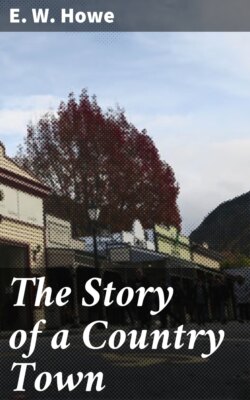Читать книгу The Story of a Country Town - E. W. Howe - Страница 3
На сайте Литреса книга снята с продажи.
PREFACE.
ОглавлениеTable of Contents
SHOULD “The Story of a Country Town” find readers, it may be interesting to them to know that it was written entirely at night, after the writer had finished a hard day’s work as editor and publisher of a small evening newspaper. I do not think a line of it was written while the sun was shining, but in almost every chapter there are recollections of the midnight bell.
No one can possibly find more fault with it than I have found myself. A hundred times I have been on the point of burning the manuscript, and never attempting it again; for I was always tired while working at it, and always dissatisfied after concluding an evening’s work. I offer this as a general apology for its many defects, and can only hope it will meet with the charity it deserves.
I believe that when I began the story I had some sort of an idea that I might be able to write an acceptable work of fiction, but I have changed it so often, and worried about it so much, that at its conclusion I have no idea whether it is very bad, or only indifferent. I think that originally I had some hope that it might enable me to get rid of my weary newspaper work, and help me to more ease than I have ever known, but I am so tired now that I am incapable of exercising my judgment with reference to it. If it prove a success or a failure I shall not be surprised, for I have no opinion of my own on the subject.
For several years I have felt that I would like an opportunity to address a larger audience than my newspaper’s circulation affords, but I find now that I am very timid about it, and worry a great deal for fear the verdict will not be favorable. A gentleman who once looked over a portion of the manuscript said his first impression was that it was the work of a tired man, and that the pen seemed to drag heavily in making the words. I fear this will be the verdict of the people, and that they will say I should have given up my newspaper writing before attempting it. The reason I did not do this was that I had no confidence in my ability to become an acceptable historian of a country town, therefore I worked harder than I should during the day, and went wearily at the story at night.
Should inquiry be made as to whether any part of the story be true, I could only reply that I have never known anyone who did not furnish some suggestion or idea in the construction of the book, as I have never lived in a town that did not afford some material for the description of Twin Mounds. I meet Jo Errings every day, and frequently lead them up to denounce their particular Clinton Bragg; I have known several John Westlocks, and I am afraid that Mateel Shepherds are more numerous than is desirable. I have known troops of Mrs. John Westlocks, for in the country where I was brought up all the women were pale, timid, and overworked; I hope that Agnes Deming can be duplicated in every community, and I believe that Big Adams are numerous everywhere; but I must confess that I never knew but one Little Biggs, though his wife may be seen hurrying out of the way, should you decide to look for her, in every third or fourth house.
I hope there will be general sympathy for Jo Erring. In writing the history of this creature of my fancy, I have almost come to believe that I have an uncle of that name, and that he lived and died as I have narrated. Sometimes I think of him wandering in the cave, crying, “Help! Help! I am lost!” and his voice is very pitiful and distressed. At other times he has come into my room and sat beside me as I wrote. I have been with him to the cave on a stormy night, and heard the beginning of the few sweet chords of music he describes, but which were immediately broken into by the furious uproar of devils; sometimes I think I have found him in every-day life, and that he is still listening at night to the horrible noise of his skeleton. If some one should confess to me that he is Jo Erring in every particular except that when the keeper of the Twin Mounds jail gave him opportunity he ran away, I believe I should be his friend.
In our part of the country there was a strange man answering to the description of Damon Barker, and I often visited him when a boy, but he lived in a hovel on the prairie, which was dirty beyond description. He had boxes filled with strange wearing-apparel, and brass pistols without number, and he told me stories; but he ran a nursery instead of a mill, though I have heard that he had a sister. I originally intended to make these two central figures in the story, but Jo Erring wandered into my mind, and I am afraid I have made sad work of him.
E. W. H.
Atchison, Kansas, Sept. 4, 1883.
